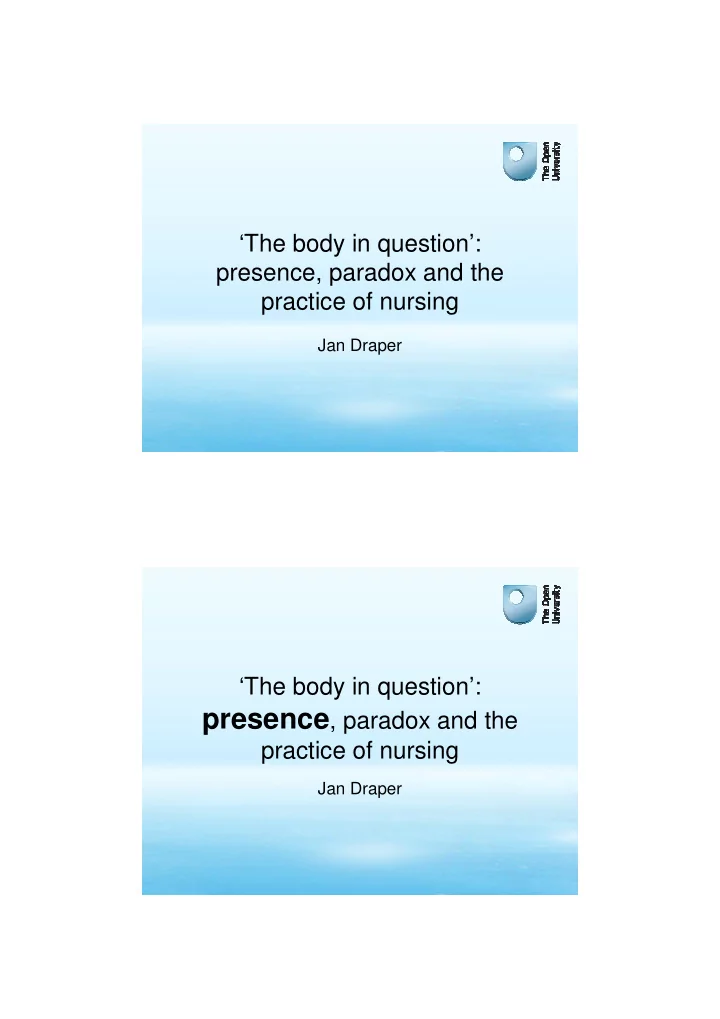

‘The body in question’: presence, paradox and the practice of nursing Jan Draper ‘The body in question’: presence , paradox and the practice of nursing Jan Draper
‘The body in question’: presence, paradox and the practice of nursing Jan Draper ‘The body in question’: presence, paradox and the practice of nursing Jan Draper
Presence Presence
Presence ‘When we wake up in the morning we may automatically leave our beds and go to the bathroom and carry out our morning ‘bodily’ routines… Once we are ‘up’ we then prepare our body for public display, we probably groom it and select some clothes which might be appropriate for what we are doing on that particular day… Everyday life is therefore fundamentally about the production and reproduction of bodies.’ Nettleton and Watson, 1998, pp. 1-2. Presence
Presence Presence
Presence Presence
Presence Presence
Presence Presence
Presence Presence
Paradox Paradox
Paradox Paradox The Anatomy Lesson of Dr Nicolaes Tulp, Rembrandt, 1632
Paradox Paradox
Paradox ‘a fracturing of different knowledges, whereby the woman’s traditional authority to confirm her pregnancy through quickening (the feel of the fetus inside) has been usurped by the more objectively verifiable medical technologies. The authority to establish pregnancy and the stage of pregnancy is invested in the machine, the operator and the visual reproduction of the fetus.’ Boulter, 1999, p. 6. Paradox • Objective • Subjective • Medical • Social • Public • Private • ‘A’ • ‘My’
Paradox ‘In the Western tradition, primary understanding of the body is dualistic: the body as a physical entity or the object body, and the body as a subjective experience or the subject body. The object body commonly is understood as the body that can be known by a third- person observer. It is a fixed, material entity: a passive object to be seen/observed/manipulated, the body as ‘it’. In contrast, the subject body is defined as the phenomenological body: the body known from the inside, the body that is experienced, the lived body, the body as ‘me’.’ Sakalys, 2006, p. 17. Paradox
Practice Practice Courtesy of the Royal College of Nursing
Practice Courtesy of the Royal College of Nursing Practice ‘Nurses are not generally gentle with their clients, in the sense of very soft, delicate touching. Because they are used to the weight of the human body, the toughness of skin, the resistance created by stiffened bones and muscles they know how to move firmly and strongly. But the very sureness and power of their touch leads to a paradoxical tenderness. The skilled nurse knows that touch needs to be powerful enough to create a sense of security.’ Groenhout, Hotz and Joldersman, 2005, p. 151.
Practice Courtesy of the Royal College of Nursing Practice Florence Nightingale 1820-1910
Practice Practice ‘Nursing’s reason for existence is precisely its focus on the body, bodily dysfunction, and the dialectic between object body and subject body. Embodiment is the locus of nursing practice and the central focus of caring … it is time to attend to the primacy of the embodiment of patients’ experiences and in caring practice, and to bring embodiment …and the body back in.’ Sakalys, 2006, p. 21.
Practice
Recommend
More recommend